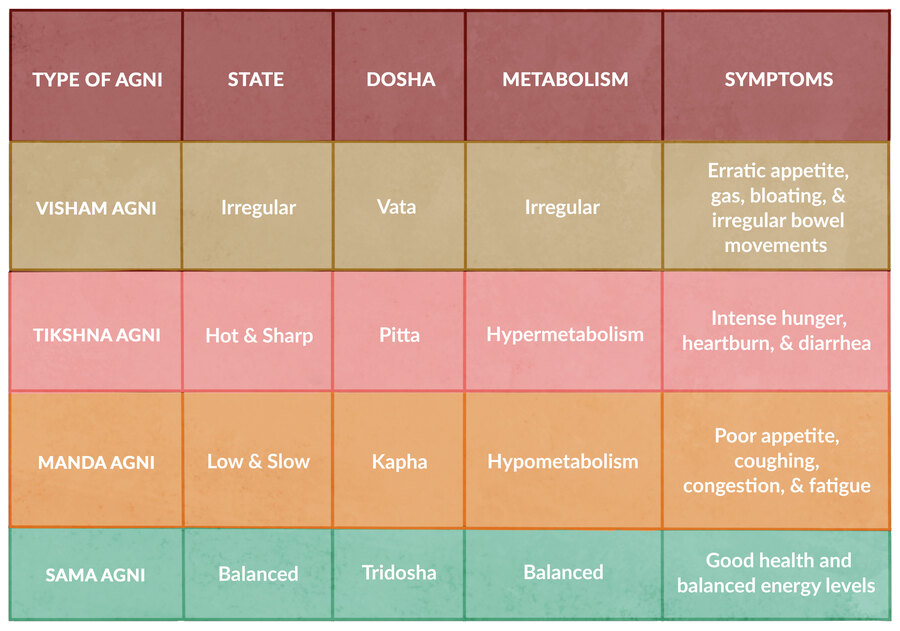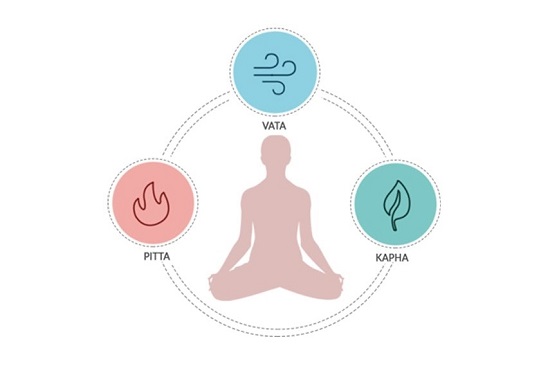Ayurveda views human health like a beautifully balanced ecosystem. It believes that every element within us — from the cells and tissues to the organs and systems — is interconnected. And when all parts work in harmony, we experience optimal health and vitality.
One of the most crucial parts of this internal ecosystem according to Ayurveda is Jatharagni. Known as our 'digestive fire', Jatharagni is a powerful force that burns within each and every one of us. Likened to the sun, it nourishes our body and provides us with the energy to not only survive but thrive.
In this in-depth guide to Jatharagni, we demystify digestive fire, exploring what it is, signs of an imbalance, and simple Ayurveda techniques to stimulate your Agni and boost gut health.
What Is Jatharagni (Digestive Fire) in Ayurveda?
Translated from Sanskrit, Agni literally means “fire”. However, in the context of Ayurveda, Jatharagni it not just any fire, but the digestive fire that is present in the intestines.
This metabolic fire is responsible for digesting food and converting it into energy, which we need to perform vital life activities like breathing. As a result, Ayurveda considers a balanced state of Agni as essential for good digestion and overall health.
How Does Jatharagni Affect the Body?
In Ayurveda, the harmony of digestive fire enables us to absorb nutrients and eliminate waste. This intricate balance is predominantly steered by the three doshas: Vata, Pitta, and Kapha.
The doshas are fundamental energies that regulate both our physical and mental processes, which include our digestion and metabolism. As a result, if any one of the doshas become stagnant it can destabilize your Jatharagni.
When your Agni is either too low or too high, it fails to operate optimally and causes a buildup of metabolic waste (Ama). This imbalance can lead to physical discomfort, potential health complications, and even disease. But Jatharagni's role extends beyond physical digestion. It also sustains our emotional and mental health by helping us digest thoughts and feelings, cultivating a positive mindset.
The 4 Types of Jatharagni Explained
According to ayurvedic scholars, Jatharagni is the root of our metabolism, nourishing and balancing Agni throughout the body. For this reason, we consider Jatharagni’s four variations — Visham, Tikshna, Manda, and Sama — key to our overall health and well-being. These variations correspond to the three doshas, determining our unique state of digestion and metabolism.

1. Visham Agni
Visham Agni is linked to the Vata dosha, which represents movement and change. This type of digestion is the most unpredictable and is caused by too much air (ether) in the body. Those with Visham Agni experience variable digestion and irregular metabolism, with common symptoms like gas, bloating, fatigue, and constipation.
2. Tikshna Agni
Tikshna Agni is like a raging bonfire. Associated with the Pitta dosha, which embodies heat and transformation, it is the result of too much fire or water in the body. This causes intense and fast digestion. If you have Tikshna Agni, you might feel an insatiable hunger and eat more often. Heartburn and diarrhea are also common.
3. Manda Agni
The stable Kapha dosha influences Manda Agni. As a result, Manda digestion is slow and heavy. Those with Manda Agni feel sluggish and tired after eating, as the body is slow to digest and extract energy from food. Along with poor appetite and digestion, this type of Agni can cause coughing, congestion, fatigue, and nausea.
4. Sama Agni
Sama Agni is the ideal state of digestion. It is like a perfectly burning fire that's neither too hot nor too weak. Sama Agni is the goal in Ayurveda, a sign of balanced doshas and healthy digestion. You feel hungry when it's time to eat, you digest your food well without discomfort, and you maintain good energy levels throughout the day — the body's systems work in perfect harmony.
See - Yoga for Balance
How to Balance Your Digestive Fire
In ayurveda, there's a popular saying: "You are what you digest, not what you eat." This means that even if we consume nutritious food, if our digestion is weak, we may not fully benefit from the nutrients it provides.
By aligning our eating habits and lifestyle with Ayurveda principles and holistic nutrition, we can fan the flames of our digestive fire and enhance our overall health. Here are a few simple ways you can stimulate and balance Agni naturally.
1. Wake up with the Sun
Ayurveda suggests that rising early in the morning, ideally around sunrise, is beneficial for our overall well-being. This is because our bodies are attuned with nature, and our digestive fire is naturally stronger when the sun is up. By waking up early and practicing invigorating activities like Sun Salutations, we can stimulate and strengthen our digestion.
2. Eat while the Sun Is up
Ayurveda encourages us to consume our meals during daylight hours when the sun is shining. This aligns with our body's natural digestive rhythm, as our digestive fire is strongest during the daytime. Eating when the sun is up ensures that our bodies can efficiently break down and absorb the nutrients from our food.
3. Cook with All Six Tastes
In ayurveda, each of the six tastes corresponds to different physiological functions. Sweet foods, for instance, can be nourishing, while bitter foods are often detoxifying. By including all six tastes (sweet, sour, salty, bitter, pungent, and astringent) in your meals, you're making sure your body receives a variety of nutrients. This well-rounded nourishment enhances digestive health and helps to complete vital bodily processes.
4. Use Herbs & Spices
Herbs and spices not only add flavor to your meals but also have medicinal properties. Many of them, like ginger, cinnamon, black pepper, and mint stimulate your Agni and relieve symptoms associated with bad digestion. It’s also important to forge healthy eating habits that align with your specific dosha type.
5. Stay Active
Regular exercise strengthens the flames of your Agni. This doesn't mean you have to run a marathon or hit the gym hard every day. Even gentle activities like daily walks, yoga, and meditation can help maintain a healthy digestive fire.
6. Get Good Sleep
When you sleep, your body goes into repair mode, which includes metabolizing and detoxifying processes governed by Agni. Consistent, quality sleep (around 7-8 hours per night for most adults) gives your body enough time to perform these functions properly. If you struggle to fall asleep at night, there are gentle yoga poses you can practice to promote a nourishing night’s rest.
Final Thought
Jatharagni is like the engine that powers our body, breaking down the physical food we consume and our emotional experiences. Therefore, balancing our digestive fire is not just about feeding our bodies, it’s about fueling our lives. Maintaining this harmony provides a foundation for vitality, health, and longevity, enabling us to lead long and happy lives.

Discover your Ayurvedic constitution (dosha-dominance) with our free self-assessment.
Fill out our specially curated assessment to discover your dosha balance.

